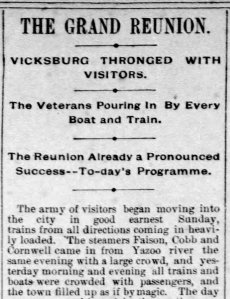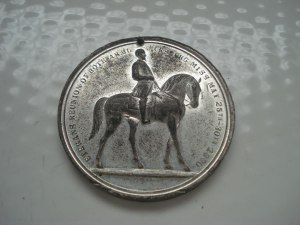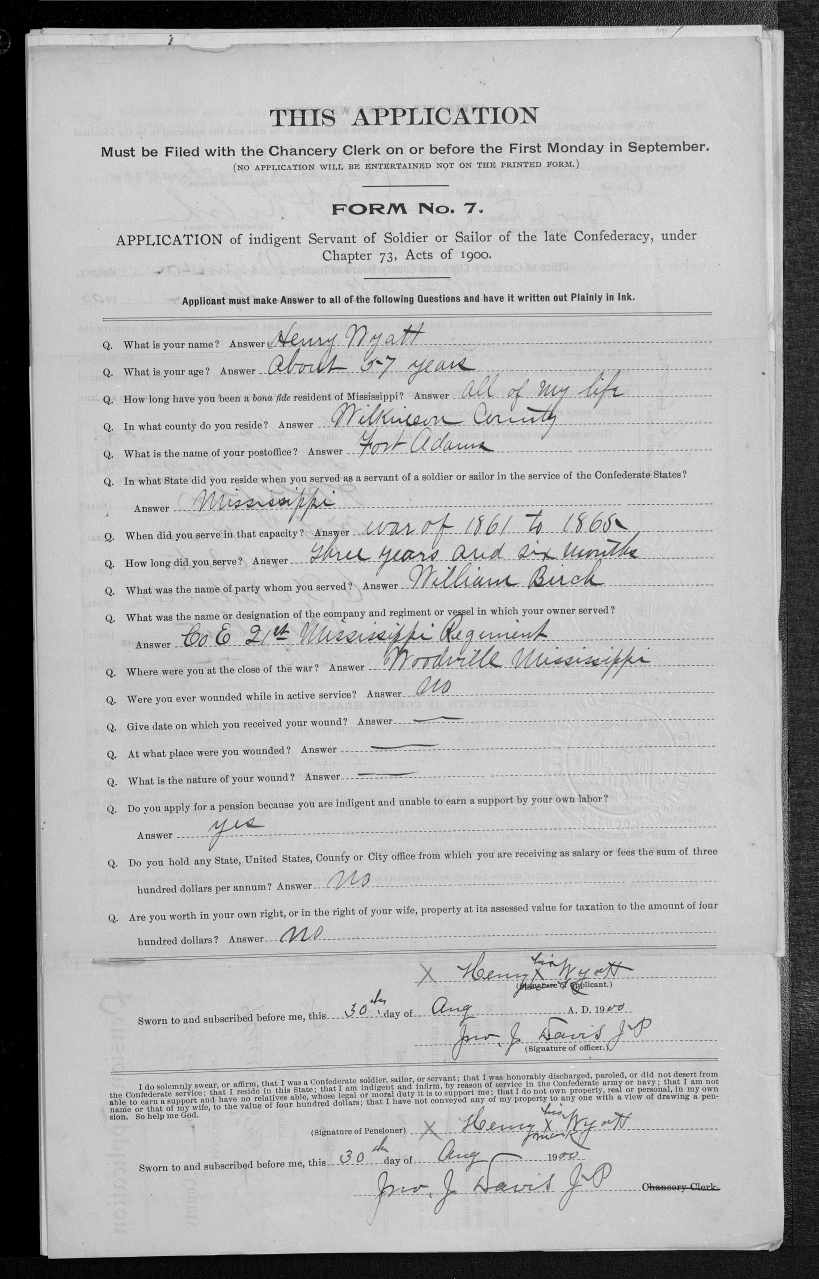The most chronically underrepresented group in first person accounts of the Civil War are without a doubt those of African Americans. Their voices are often silent, or their stories have to be told by others, simply because of the dearth of letters, diaries, and reminiscences of black soldiers and slaves. Thus I was very excited to find the following letter published in a Greenville newspaper in 1890:
Fort Adams, Miss., April 25, 1890
Mr. J.S. McNeily, Greenville:
Dear Sir – I write to you to ascertain if yourself and Mr. W.K. Gildart and any of Company

E, 21st Mississippi Regiment expect to attend the reunion of the Confederate soldiers at Vicksburg on the 25th to the 30th of May, as I would like to see and meet with all my friends, as we may never meet again. Please be sure and answer me at once, as I don’t wish to go unless I can meet you all. I will be more than proud to meet you, especially on account of your favors in the past, which I will never forget.
I am still a true and tried Democrat and am still with my party and the people. I wish to hear from you in regard to the meeting. I have nothing more to write. Only write soon.
I remain your obedient servant,
Henry Wyatt, Col’d
Henry was a popular member of the regimental servants squad. He will especially remembered by a pathetic circumstance at the death of his master, Orderly Sergeant Beech of Company E, a mere boy but a brave and tried soldier. Killed at the battle of Cedar Creek, the news of his death brought Henry to the front, regardless of the dangers of which he ordinarily had a ludicrously lively sense. After a brief indulgence in lamentations he set about burying the corpse, but was interrupted by the renewal of battle and rout of the Confederates. Under hot fire he bore the remains on his shoulders along with the retreat, only relinquishing his sad task to avoid capture.
(The Weekly Democrat-Times, Greenville, Mississippi, May 10, 1890)
Henry Wyatt, was not a soldier; he was a slave, bound to serve his master, William H. Beach, a member of the “Hurricane Rifles,” Company E, 21st Mississippi Infantry. Beach had enlisted in the 21st Mississippi on June 6, 1861, as a private, and he must have shown some talent as a soldier, for he was promoted to 4th corporal on January 1, 1863, and to 1st sergeant on August 1, 1863. This was a very rapid rise in rank for a boy who was only 17 at the time he enlisted. William H. Beach received a minor wound at the battle of Chickamauga, on September 20, 1863; he recovered from his injury only to be killed in action at the battle of Cedar Creek, October 19, 1864, leading to the recovery of his body by his slave Henry Wyatt.
I started looking for background information on Henry Wyatt, and the first thing I found on him was a listing in the 1870 United States Census for Wilkinson County, Mississippi. He was listed as a “farm laborer” along with his wife Anna, and children Malinda, Monroe and Robena. I was unable to find Wyatt in the 1880 census, but I did find him in the 1890 Veteran’s Schedules – it was only supposed to record Union veterans, but some former Confederate soldiers and servants were enumerated as well, and he was one of them.

I was curious to know if Henry Wyatt attended the 1890 reunion at Vicksburg. I did some looking and was rewarded with an article in a local newspaper published under the title, “A Veteran’s Arrival.”
Henry Wyatt, colored, attached during the late war to the 21st Mississippi Regiment and

who was noted throughout the war for going wherever the regiment did, arrived yesterday on the steamer Laura Lee from Fort Adams, to attend the reunion and was received as an honored guest and at once provided with quarters. He went out with the regiment and returned with it at the close of hostilities, being faithful to the end, as he has been indeed ever since. He now holds a position of trust at the Fort Adams landing acting as night watchman and clerk, handling and receiving freight, etc. His only object in coming, as he expressed it is “to meet the boys.”
He will be remembered by all survivors of the gallant Twenty-First and especially by the members of Company E, for his gallant attempt to recover the body of his young master, in the midst of a heavy fire from the enemy.
(The Daily Commercial Herald, Vicksburg, Mississippi, May 24, 1890)
Wyatt apparently made regular appearances on the reunion circuit, as I found this article in an 1895 Jackson newspaper:
There is present in attendance on the Reunion of the Veterans a colored man from Wilkinson county, Henry Wyatt, who has a record to be proud of. He was a servant in the Twenty-First Regiment, and at the battle of Cedar Creek he went into the thickest of the fight and bore off the body of his young master, who was killed. Henry has been a staunch Democrat since the war and is still an enthusiastic ex-Reb. All honor to such colored men. (The Clarion-Ledger, January 22, 1895) This same issue of the paper listed the veterans attending the Jackson reunion – among those mentioned was ‘Henry Wyatt, (col.)‘ an ‘honorary member‘ of Woodville Camp Number 48 of the United Confederate Veterans.
Henry Wyatt passed away in 1907, and the newspaper carried a lengthy obituary for him:
A Worthy Negro Goes to His Reward.
Col. Matt Johnson, who served his full term as a Confederate soldier, and who is a prominent citizen of Natchez, states that ‘Henry Wyatt, a good old Confederate negro was buried today (Friday) and is gone to where the good negroes go. In a letter from Capt. J.S. McNeily of the Vicksburg Herald, he speaks of old Henry as an honest, worthy and brave man. His owner was my friend and messmate during the war. Henry cooked for us until late in the war when his master was killed on the battlefield.
Henry went forward between the line of battle, shouldered his master and carried him to the rear. In so doing he was severely wounded in both hands, one shot entirely off. He has been receiving a Confederate pension of which he was worthy. He wore the cross of honor of Confederate Veterans and other insignias of worthy conduct. Since the war for the last twenty-six years, old Henry has been landing-keeper at Fort Adams and performed his duty to the satisfaction of the owners and all river men who knew him and speak of him in the highest praise of many acts of honesty and bravery.
Capt. McNeily of Vicksburg, in writing to me about him, says: ‘I will stand for anything that this good man needs. It is with great pleasure to tell you and the public of the life and deeds of this good old negro for there are not many left of his character.’ – Natchez Democrat
That old darky was what he was because of his training by white people, and for his white folks he would have suffered any kind of torture. Here in Yazoo there are still some of the ‘old guard,’ of blacks, but they are fast passing away. Would not training by whites have some influence on the younger generation, and be better for them and the country than cutting them off entirely, leaving them to be trained by their own superstitious race?
(The Yazoo Herald, Yazoo City, Mississippi, April 19, 1907)
There was a place for men like Henry Wyatt at Confederate reunions, as long as they fit into the very narrow confines of the Lost Cause narrative: faithful slaves that willingly served their masters in time of war. To all outward appearances, Wyatt cheerfully stayed within the boundaries set for him by white society, but he did have a powerful financial reason for doing so. Henry Wyatt began receiving a Confederate servant’s pension from the state of Mississippi in March 1894, and to continue receiving this allotment he had to be very careful about what he said and did.

Without additional information, such as letters, diaries or interviews, it’s hard to say with any certainty what Wyatt’s true feelings about the war and his place in it were. I will keep a sharp eye out, and perhaps someday I will find some additional evidence regarding Henry Wyatt’s thoughts on the Civil War.
Thank you for the story about Henry Wyatt. My G grandfather, Sgt. William Gove Clampitt and two of his brothers, Richard A. and James joined Co E, 21st Miss Inf at Woodville but William was sent home because he was too young so he went to his uncle’s home in Arkansas and joined the cavalry. The first Capt of Co E was Issac Davis Stamps(nephew of Jefferson Davis). He was killed at Gettysburg. The Hurricane Rifles were sponsored by Jefferson Davis’s elder brother, Joseph Emory Davis of Hurricane Plantation.
You are very welcome, I’m glad you liked the article.
My ancestor was in the 17th Mississippi which was brigaded with Henry Wyatt’s 21st Mississippi Regiment. Interesting that you found these articles about him from various times and dates.
Thanks for the kind words. Keep watching, I am working on an article right now based on a series of letters written by a soldier in the 17th Mississippi
There is a very good journal of a soldier in the 17th Mississippi Regiment—one of the best that I’ve read–entitled “A Life For the Confederacy”. A few years ago, I discovered that he and his brother are buried in a grave yard that is pretty much abandoned. It is located about 200 yards behind my daughter’s house in Marshall County.